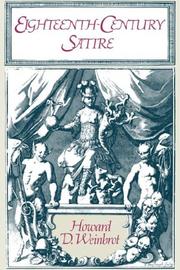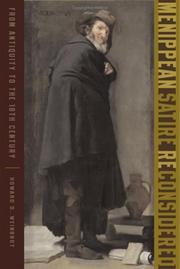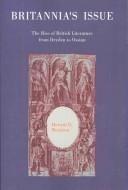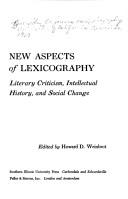| Listing 1 - 10 of 27 | << page >> |
Sort by
|

ISBN: 0521325137 0521034094 0511553560 Year: 1988 Publisher: Cambridge University Press
Abstract | Keywords | Export | Availability | Bookmark
 Loading...
Loading...Choose an application
- Reference Manager
- EndNote
- RefWorks (Direct export to RefWorks)
Howard D. Weinbrot here collects thirteen of his most important essays on Restoration and eighteenth-century British satire. Divided into sections on 'contexts' and 'texts', the essays range widely and deeply across the spectrum of satiric kinds, satirists, satires, and scholarly and critical problems. In 'Contexts', Professor Weinbrot discusses the pattern of formal verse satire of blame and praise popularized by Dryden in 1693 and influential throughout the next century, challenges the traditional view that Hprace and 'Augustanism' define eighteenth-century satire, and focuses on the vexed question of whether there was indeed a 'persona' or theory of masking at work in eighteenth-century satire. In 'Texts' he deals with several of the most important verse satirists and satires of the period and closely analyses them within their historical and artistic frameworks. Clearly written, learned, and often witty, this book is committed to critical inquiry that respects the integrity of its texts. It also emphasized the breadth of context that enriches our understanding of satire and the relationships among the nurturing culture, the producing poet, the poem producers, and the poem as received in its age.
Poetry --- English literature --- anno 1700-1799 --- Arts and Humanities --- Literature --- Satire, English --- History and criticism.

ISBN: 0801882109 Year: 2005 Publisher: Baltimore Johns Hopkins university press
Abstract | Keywords | Export | Availability | Bookmark
 Loading...
Loading...Choose an application
- Reference Manager
- EndNote
- RefWorks (Direct export to RefWorks)
English literature --- Comparative literature --- History of ancient Greece --- anno 1700-1799 --- Classicism --- Satire --- Satire, English --- History --- Classical influences. --- History and criticism. --- Pope, Alexander, --- Richardson, Samuel, --- Swift, Jonathan, --- Knowledge --- Literature. --- 820-7 --- Engelse literatuur: humor; satire --- 820-7 Engelse literatuur: humor; satire --- History and criticism --- Comic literature --- Literature --- Wit and humor --- Invective --- Civilization, Classical --- Classical influences --- Swift, Jonathan --- di Marco, Corolini --- Swift, Dean --- Gulliver, Lemuel --- Pope, Alexander --- Popiĭ, Aleksandr, --- Barnivelt, Esdras, --- Poup, Aleksandr, --- Svift, Dzhonatan, --- Du Baudrier, --- Wagstaff, Simon, --- Fribble, Timothy, --- Baudrier, --- Drapier, M. B., --- Swift, J. --- Author of The conduct of the allies, --- Conduct of the allies, Author of the, --- Philomath, T. N., --- T. N., --- N., T., --- TN, --- Swift, --- Hope, Thomas, --- A. B., --- B., A., --- Author of The short view of the state of Ireland, --- Short view of the state of Ireland, Author of the, --- Author of Gulliver's travels, --- Gulliver's travels, Author of, --- S --- -t, --- D--n S --- -t --- Sṿifṭ, Yonatan, --- Misosarum, Gregory, --- Ssu-wei-fo-tʻe, Kʻuang-sheng, --- Fizle, Obadiah, --- Soyipht, Tzonathan, --- Soyipht, Iōnathan, --- Swift, Jonatán, --- Свифт, Джонатан, --- סבפט, יונתן, --- סוויפט, יאנאטהאן, --- סויפט, יונתן, --- סװיפט, יאנאטהאן, --- סװיפט, י., --- Bickerstaff, Isaac, --- Sviphṭa, Jonāthana, --- M., Stephen, --- Author of A tale of a tub,

ISBN: 0521325196 0521034108 0511553552 Year: 1993 Publisher: Cambridge : Cambridge University Press,
Abstract | Keywords | Export | Availability | Bookmark
 Loading...
Loading...Choose an application
- Reference Manager
- EndNote
- RefWorks (Direct export to RefWorks)
This, Howard D.Weinbrot's magnum opus, draws on a large range of material to chronicle the developing confidence in British national literature from the 1670s to the 1770s. Using varied biblical, classical, English, economic, French, historical, literary, philosophical, political and Scottish sources, Professor Weinbrot shows that one of the central trends of eighteenth-century Britain was the movement away from classical towards native values and models. He demonstrates for example that Dryden's Essay of Dramatick Poesy reflects nationalist aesthetics, that Pope's Rape of the Lock affirms domestic peace while rejecting Homeric violence, and that Windsor Forest sings un-Roman peaceful expansion through trade. This learned and lucidly written book offers revisionist but historically grounded interpretations of these and many other important works. It also helps to characterize the complex and varied culture in eighteenth-century Britain.
Aesthetics, British --- English literature --- National characteristics, British, in literature --- Nationalism --- Nationalism in literature --- Nativism in literature --- Esthétique britannique --- Littérature anglaise --- Caractéristiques nationales britanniques dans la littérature --- Nationalisme --- Nationalisme dans la littérature --- History and criticism --- History --- Histoire et critique --- Histoire --- Great Britain --- Grande-Bretagne --- In literature --- Dans la littérature --- Aesthetics, British. --- National characteristics, British, in literature. --- Nationalism in literature. --- Nativism in literature. --- History and criticism. --- Esthétique britannique --- Littérature anglaise --- Caractéristiques nationales britanniques dans la littérature --- Nationalisme dans la littérature --- Dans la littérature --- Arts and Humanities --- Literature --- Macpherson, James, --- In literature. --- Aesthetics, English --- British aesthetics --- English aesthetics --- Consciousness, National --- Identity, National --- National consciousness --- National identity --- International relations --- Patriotism --- Political science --- Autonomy and independence movements --- Internationalism --- Political messianism

ISBN: 0809305151 9780809305155 Year: 1972 Publisher: Carbondale Southern Illinois university press
Abstract | Keywords | Export | Availability | Bookmark
 Loading...
Loading...Choose an application
- Reference Manager
- EndNote
- RefWorks (Direct export to RefWorks)
Lexicography --- Encyclopedias and dictionaries --- Lexicography.
Book
ISBN: 0691063443 1400871700 0691643806 9781400871704 9780691616513 0691616515 Year: 2015 Publisher: Princeton, NJ
Abstract | Keywords | Export | Availability | Bookmark
 Loading...
Loading...Choose an application
- Reference Manager
- EndNote
- RefWorks (Direct export to RefWorks)
Howard D. Weinbrot challenges the view that the period 1660-1800 is correctly regarded as the "Augustan" age of English literature, a time in which classical Augustan ideals provided a main source of inspiration. Scholars have held that British writers of the Restoration and eighteenth century considered Augustus Caesar to be the model of the wise ruler who enabled political, literary, and moral wisdom to flourish. This book shows on the contrary that classical standards, though often invoked, were often rejected by many informed citizens and writers of the day.Anti-Augustan sentiment consolidated by the 1730s, when both Whig and Tory, court and country, viewed Augustus as the enemy of the mixed and balanced constitution that was responsible for British liberty. Professor Weinbrot focuses in particular on literature and its classical backgrounds, reinterpreting major works by Pope and Gibbon.Originally published in 1978.The Princeton Legacy Library uses the latest print-on-demand technology to again make available previously out-of-print books from the distinguished backlist of Princeton University Press. These editions preserve the original texts of these important books while presenting them in durable paperback and hardcover editions. The goal of the Princeton Legacy Library is to vastly increase access to the rich scholarly heritage found in the thousands of books published by Princeton University Press since its founding in 1905.
Augustus, Emperor of Rome, 63 B.C.-14 A.D. -- In literature. --- Augustus, Emperor of Rome, 63 B.C.-14 A.D. -- Influence. --- Classicism -- England -- History -- 18th century. --- English literature -- 18th century -- History and criticism. --- English literature -- Roman influences. --- Latin literature -- Appreciation -- England. --- Rome -- In literature. --- Classicism --- English literature --- Latin literature --- History --- Roman influences. --- Appreciation --- History and criticism. --- Augustus, --- Influence. --- In literature. --- Rome --- Octavius Caesar, --- Gaius Octavius, --- Octavius, Gaius, --- Octavianus, --- Octavianus, Gaius Julius Caesar, --- Gaius Julius Caesar Octavianus, --- Octavian, --- Caius Julius Caesar Octavianus, --- T︠S︡ezarʹ Oktavian Avgust, --- Oktavian-Avgust, T︠S︡ezarʹ, --- Avgust, T︠S︡ezarʹ Oktavian, --- Octavianus Augustus, --- Augusto, --- Cesarz August, --- Ogusṭus, --- Augustus Caesar, --- Gaius Octavius Thurinus, --- Octavio Augusto, --- Cayo Octavio Turino, --- Thurinus, Gaius Octavius, --- Turino, Cayo Octavio, --- אוגוסטוס --- Classicism. --- English literature. --- History and criticism --- 1700-1799. --- Great Britain. --- Littérature anglaise --- Classicisme --- Littérature latine --- 18e siècle --- Histoire et critique
Book
ISBN: 0691614288 1400857376 9781400857371 9780691065106 0691065101 9780691614281 Year: 1982 Publisher: Princeton (N.J.): Princeton university press
Abstract | Keywords | Export | Availability | Bookmark
 Loading...
Loading...Choose an application
- Reference Manager
- EndNote
- RefWorks (Direct export to RefWorks)
Ranging over the tradition of verse satire from the Roman poets to their seventeenth- and eighteenth-century imitators in England and France, Howard D. Weinbrot challenges the common view of Alexander Pope as a Horatian satirist in a Horatian age.Originally published in 1982.The Princeton Legacy Library uses the latest print-on-demand technology to again make available previously out-of-print books from the distinguished backlist of Princeton University Press. These editions preserve the original texts of these important books while presenting them in durable paperback and hardcover editions. The goal of the Princeton Legacy Library is to vastly increase access to the rich scholarly heritage found in the thousands of books published by Princeton University Press since its founding in 1905.
Verse satire --- Poetic satire --- Satiric poetry --- Satirical poetry --- Satirical verse --- Verse satires --- Poetry --- Satire --- History and criticism. --- Pope, Alexander, --- Criticism and interpretation. --- 820 "17" POPE, ALEXANDER --- 820 "17" POPE, ALEXANDER Engelse literatuur--18e eeuw. Periode 1700-1799--POPE, ALEXANDER --- Engelse literatuur--18e eeuw. Periode 1700-1799--POPE, ALEXANDER --- History and criticism --- Pope, Alexander --- Popiĭ, Aleksandr, --- Barnivelt, Esdras, --- Poup, Aleksandr,
Book
Year: 1969 Publisher: Chicago : University of Chicago Press,
Abstract | Keywords | Export | Availability | Bookmark
 Loading...
Loading...Choose an application
- Reference Manager
- EndNote
- RefWorks (Direct export to RefWorks)
English poetry --- Classicism --- Verse satire, English --- Imitation in literature. --- History and criticism --- History --- History and criticism. --- Roman influences. --- Augustus, --- Influence.
Book
Year: 1969 Publisher: Chicago (Ill.): University of Chicago press
Abstract | Keywords | Export | Availability | Bookmark
 Loading...
Loading...Choose an application
- Reference Manager
- EndNote
- RefWorks (Direct export to RefWorks)
Book
Year: 1968 Publisher: Chicago-London University of Chicago Press
Abstract | Keywords | Export | Availability | Bookmark
 Loading...
Loading...Choose an application
- Reference Manager
- EndNote
- RefWorks (Direct export to RefWorks)
Book
Year: 1972 Publisher: Carbondale-Edwardsville London-Amstersam Southern Illinois University Press Feffer & Simons
Abstract | Keywords | Export | Availability | Bookmark
 Loading...
Loading...Choose an application
- Reference Manager
- EndNote
- RefWorks (Direct export to RefWorks)
| Listing 1 - 10 of 27 | << page >> |
Sort by
|

 Search
Search Feedback
Feedback About UniCat
About UniCat  Help
Help News
News